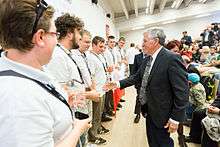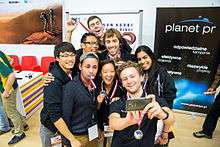European Rover Challenge
European Rover Challenge, (ERC) – The annual international Martian robots competition attended by teams from around the world. The competition has been organized since 2014 in Poland.

The ERC is the biggest robotics and space event in Europe addressed to the world of science and business, the new technologies sector as well as the general public. The European Rover Challenge, like the University Rover Challenge, is a part of the Rover Challenge Series – the most prestigious robotics competitions in the world.
The core of ERC is an international Martian robot competition (so-called Mars rover analogs) attended by students, graduates, and researchers from universities around the world. The teams consist of several people who work hard on a fully functional next-generation Mars robot for 12 months. Each team includes specialists in mechatronics, automation, robotics, autonomy, connectivity, and navigation. They come with departments connected with administrations, team management, promotion, and finances.
Traditionally the competition is accompanied by events addressed to the wider public, such as the Science and Technology Show Zone, lectures delivered by experts, and film screenings related to space. Those participants who are involved with the space sector can take part in workshops as well as substantive and mentoring meetings, panel discussions, and debates.
Competition history
The European Rover Challenge has been organized since 2014. The plans to organise the first edition were announced at the International Space Week[1]. From the very beginning, its originators expected the competition to have an international character and a wide range.
1st edition (5-7 September 2014)
The first edition of ERC took place at the Regional Science and Technology Centre in Chęciny near Kielce, Świętokrzyskie Voivoedship. The competition was attended by nine teams from Poland, Lithuania, India, Egypt, and Colombia. Among the guests, there was Professor Scott Hubbard, former head of NASA’a Ames Research Centre, and Robert Zubrin, founder of the Mars Society.[2]
Winners:
- 1st place: SCORPIO, Wrocław, Poland
- 2nd place: IMPULS, Kielce, Poland
- 3rd place: Lunar and Mars Rover Team, Kairo, Egypt
During the event, the Regional Science and Technology Centre, where the competition took place, was officially opened.
2nd edition (4-6 September 2015)
The second edition of ERC also took place at the Regional Science and Technology Centre. The competition was attended by 29 teams from the USA, Australia, India, Colombia, the Netherlands, Egypt, Poland, Canada, and other countries. Specials guests of the second edition included the last man on the Moon, Apollo 17 astronaut, Harrison Schmitt, and writer Andy Weir (the meeting was conducted remotely).
Winners:
- 1st place: USST, Canada
- 2nd place: Next, Białystok, Poland
- 3rd place: McGill Robotics, Canada
3rd edition (10-12 September 2016)
In 2016 the competition took place in Jasionka near Rzeszów. The competition was attended by 23 teams from Poland (15 teams), Australia, Canada, Bangladesh, India, Turkey, Nepal, and other countries.
An important event during the ERC was a Polish part of a civil debate on the future of space exploration organized by the European Space Agency. The debate took place in 22 countries at the same time and was attended by 2,000 people who were not involved with the space sector. They discussed such subjects as space exploration, using its resources, and the growing importance of space. Its objective was to verify public opinion and the results were to be considered while developing future strategies of ESA[3].
Winners:
- 1st place: Raptors, Poland
- 2nd place: Impuls, Poland
- 3rd place: McGill Robotics, Canada
4th edition (14-15 September 2018)
The fourth edition of the European Rover Challenge was organized in Starachowice, at the Museum of Nature and Technology. The competition was attended by 35 teams from 20 countries[4]. The fourth edition of the challenge was accompanied by the biggest Science and Technology Show Zone in history. It attracted over 25,000 visitors. Among the guests there was astronaut Tim Peake, Artemis Westenberg - President of Explore Mars Europe, Gianfranco Visentin, Head of Automation and Robotics Section at ESA, and Maria Antonietta Perino, Head of Advanced Exploration Programmes at Thales Alenia Space.
It was the first time when Pro Formula was organized along with the competition. It was addressed to professionals from the space sector and constructors of space robots who wanted to test their constructions in the Mars Yard without participating in the challenge[5].
Winners:
- 1st place: Impuls, Poland
- 2nd place: Raptors, Poland
- 3rd place: Robotics for Space Exploration, Canada
- Jury Award: RoverOva, Czech Republic
5th edition (13-15 September 2019)
The ERC 2019 took place at the Kielce University of Technology with over 40 teams qualified for the competition.
The fifth edition of the challenge was accompanied by the Mentoring and Business Conference attended by representatives of the space sector from Poland, Europe and the whole world, including Steve Jurczyk, Associate Administrator at NASA, Maria Antonietta Perino from Thales Alenia Space, Gianfranco Visentin and Pantelis Poulakis from ESA and Artemis Westenberg from Explore Mars Europe.
Winners:
- 1st place: Impuls, Poland
- 2nd place: AGH Space Systems, Poland
- 3rd place: RoverOva, Czech Republic
6th edition (11-13 September 2020)
The ERC 2020 takes place as a remote rover competition.
During the competition, a robot provided by the organizer will be controlled by all finalists via an interface, whereby various tasks will be performed. In this edition of the Challenge, prizes were awarded in three categories even before the actual start.
- Best Science Design: ERIG e.V. ORTHOS, Germany – for depth analysis and showing a truly interdisciplinary approach
- Best Docs: STAR Dresden e.V, Germany – excellent preparation of documentation according to ERC rules and showing great professionalism
- Best Design: AGH Space System, Poland – for the overall best design of ERC rover
Tasks

During the competition the teams have to complete five tasks:
- Science Task – The first task is to take soil samples (including one from a deep layer of the Mars Yard) by using any technique (e.g.: drilling) and secure them properly for testing;
- Maintanance Task – The teams must maneuver their robots to complete a designated route towards a control panel and perform several manual operations, such as setting switches to the right position, making electric measurements, observing control panels, etc.;
- Collection Task – In order to complete this task, rovers must find and collect containers with samples from three different locations and then deliver them to a designated place safely;
- Traverse Task – The task is to find different points in the Mars Yard without using the image from the rover’s camera. Rovers should navigate themselves using only a map;
- Presentation Task – In the given time limit the teams must present themselves, their project stages, and the biggest challenges they faced while constructing the rover. Team members also must be prepared for potential jurors’ questions.
The tasks are based on roadmaps – documents used in planning strategic missions of NASA and ESA. They are completed in the Mars Yard created from several tons of soil in the color reminding the surface of Mars. It includes natural obstacles copying the Martian landscapes.
Unlike other competitions of this kind, it is not allowed to use GPS during the ERC and team members do not see the robots they are navigating. They can only use their robot’s camera view[6].

Bibliography
- Wilczyński, Łukasz. "European Rover Challenge". planetpr.pl.
- Nowakowski, Tomasz. "Canada dominates European Rover Challenge". Science X network.
- Sloan, Kevin. "2016 European Rover Challenge Kicks Off". marssociety.org.
- Czapski, Michal. "European Rover Challenge 2015 – the biggest open air space event in Europe". oewf.org.
References
- "The first European Mars rovers competition in 2014 in Poland". Science in Poland. Retrieved 2019-09-09.
- Kiszniewski, Aleksander. "Marsjańskie łaziki w Polsce - European Rover Challenge". Komputer Świat. Retrieved 9 September 2019.
- "European Rover Challenge, czyli bliżej Marsa". magazynterazpolska.pl (in Polish). Retrieved 2019-09-09.
- "The team from Kielce University of Technology wins the European Rover Challenge". Science in Poland. Retrieved 2019-09-09.
- PlanetPartners. "Coraz wyższy poziom European Rover Challenge". European Rover Challenge (in Polish). Retrieved 2019-09-09.
- PlanetPartners. "Marsjański tor przeszkód – konkurencje zawodów ERC". European Rover Challenge (in Polish). Retrieved 2019-09-09.